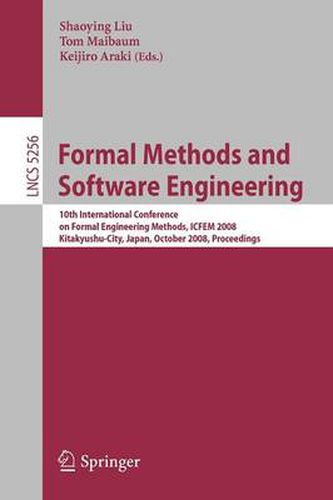Readings Newsletter
Become a Readings Member to make your shopping experience even easier.
Sign in or sign up for free!
You’re not far away from qualifying for FREE standard shipping within Australia
You’ve qualified for FREE standard shipping within Australia
The cart is loading…






This title is printed to order. This book may have been self-published. If so, we cannot guarantee the quality of the content. In the main most books will have gone through the editing process however some may not. We therefore suggest that you be aware of this before ordering this book. If in doubt check either the author or publisher’s details as we are unable to accept any returns unless they are faulty. Please contact us if you have any questions.
Formal engineering methods are intended to o?er e?ective means for integ- tion of formal methods and practical software development technologies in the context of software engineering. Their purpose is to provide e?ective, rigorous, and systematic techniques for signi?cant improvement of software productivity, quality, and tool supportability. In comparison with formal methods, a distinct feature of formal engineering methods is that they emphasize the importance of the balance between the qualities of simplicity, visualization, and preciseness for practicality. To achieve this goal, formal engineering methods must be - veloped on the basis of both formal methods and existing software technologies in software engineering, and they must serve the improvement of the softwa- engineering process. ICFEM 2008 marks the tenth anniversary of the ?rst ICFEM conference, which was held in Hiroshima in 1997. It aims to bring together researchers and practitioners who are interested in the development and application of formal engineering methods to present their latest work and discuss future research directions. The conference o?ers a great opportunity for researchers in both formal methods and software engineering to exchange their ideas, experience, expectation and to ?nd out whether and how their research results can help advance the state of the art.
$9.00 standard shipping within Australia
FREE standard shipping within Australia for orders over $100.00
Express & International shipping calculated at checkout
This title is printed to order. This book may have been self-published. If so, we cannot guarantee the quality of the content. In the main most books will have gone through the editing process however some may not. We therefore suggest that you be aware of this before ordering this book. If in doubt check either the author or publisher’s details as we are unable to accept any returns unless they are faulty. Please contact us if you have any questions.
Formal engineering methods are intended to o?er e?ective means for integ- tion of formal methods and practical software development technologies in the context of software engineering. Their purpose is to provide e?ective, rigorous, and systematic techniques for signi?cant improvement of software productivity, quality, and tool supportability. In comparison with formal methods, a distinct feature of formal engineering methods is that they emphasize the importance of the balance between the qualities of simplicity, visualization, and preciseness for practicality. To achieve this goal, formal engineering methods must be - veloped on the basis of both formal methods and existing software technologies in software engineering, and they must serve the improvement of the softwa- engineering process. ICFEM 2008 marks the tenth anniversary of the ?rst ICFEM conference, which was held in Hiroshima in 1997. It aims to bring together researchers and practitioners who are interested in the development and application of formal engineering methods to present their latest work and discuss future research directions. The conference o?ers a great opportunity for researchers in both formal methods and software engineering to exchange their ideas, experience, expectation and to ?nd out whether and how their research results can help advance the state of the art.